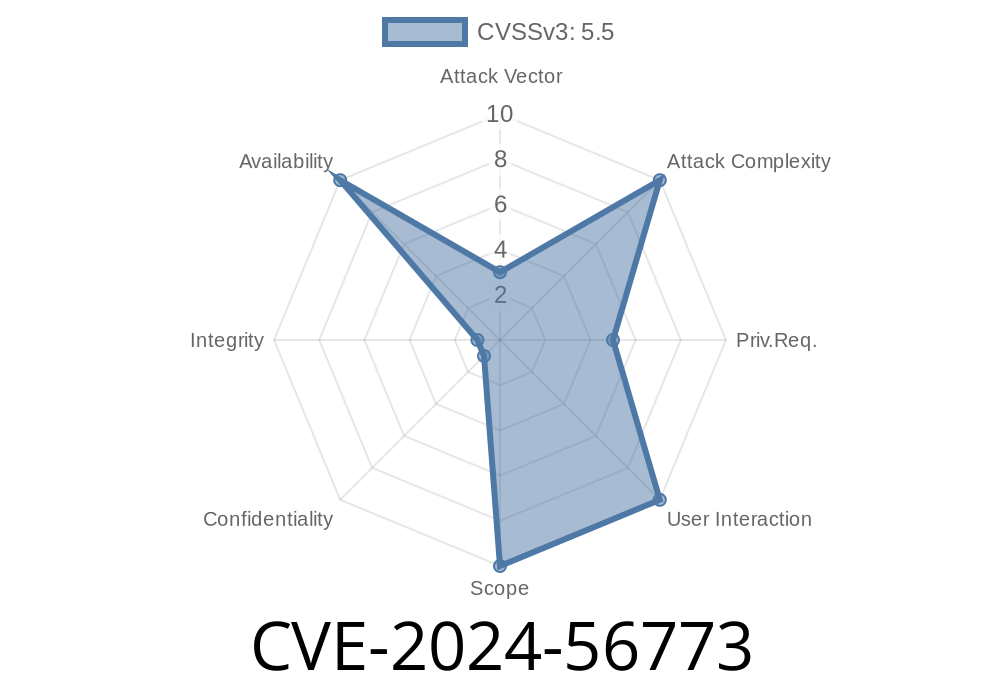The Linux Kernel's Kunit testing framework helps developers write unit tests for kernel code. However, in 2024, a new vulnerability—CVE-2024-56773—was identified and fixed. This flaw could cause a kernel crash, or potentially allow more severe attacks, if a specific kernel test is triggered. Let’s dive deep into what caused CVE-2024-56773, look at the related code, explore how it could be exploited, and how it was fixed.
What is CVE-2024-56773?
CVE-2024-56773 is a vulnerability in the kunit subsystem of the Linux kernel. More specifically, it’s found in the kunit_device_driver_test() function, where a missing null check could lead to a *null pointer dereference*. In plain terms: if the kernel couldn’t allocate memory for a test structure, it would still try to use the resulting null pointer. That causes the kernel to crash.
While exploiting this in production systems is uncommon, the issue still puts the kernel at risk, especially during automated testing or in development environments.
Here’s a simplified code snippet showing the vulnerable section, before the fix
static void kunit_device_driver_test(void)
{
struct kunit_device_driver_test_state *test_state;
// This function allocates memory with zero-initialization.
test_state = kunit_kzalloc(sizeof(*test_state), GFP_KERNEL);
// The problem: What if test_state is NULL? Next lines would crash.
test_state->dev_name = "test-kunit-dev";
// ... rest of the test initializes and uses test_state ...
}
What went wrong:
If kunit_kzalloc() failed to allocate memory (for example, due to memory pressure), it would return NULL. The following line tries to set test_state->dev_name—dereferencing a null pointer and causing a kernel panic.
The Patch: How Was It Fixed?
Developers applied a simple but effective fix: they checked whether test_state was NULL before using it.
Patched code
static void kunit_device_driver_test(void)
{
struct kunit_device_driver_test_state *test_state;
test_state = kunit_kzalloc(sizeof(*test_state), GFP_KERNEL);
// FIX: Check if allocation succeeded
if (!test_state)
return; // Don't continue if allocation failed
test_state->dev_name = "test-kunit-dev";
// ... rest of the test ...
}
Now, if memory allocation fails, the function exits early and the crash is avoided.
This bug is primarily a risk during automated kernel testing or fuzzing. Potential scenarios
- A malicious kernel module, or user with access to testing interfaces, could intentionally exhaust kernel memory.
- Triggering kunit_device_driver_test() under memory pressure could cause a *system panic*, leading to a denial of service (DoS).
- In rare setups where automated testing is exposed in production (not recommended), this could open up an attack surface.
Note:
This vulnerability can’t be triggered directly by normal unprivileged users, since Kunit tests aren’t usually exposed that way in built kernels.
Proof-of-Concept (PoC): Triggering the Bug
To illustrate what could happen, here’s how the crash might occur (if you deliberately call this function with simulated memory failure):
// Simulate allocation failure (pseudocode for illustration)
#define kunit_kzalloc(size, flags) (NULL) // Always fails
void kunit_device_driver_test(void)
{
struct kunit_device_driver_test_state *test_state;
test_state = kunit_kzalloc(sizeof(*test_state), GFP_KERNEL);
// The next line will crash
test_state->dev_name = "test-kunit-dev";
}
If you run this on a real kernel, trying to access a member of a null pointer would crash the system.
Original Fix Commit:
kunit: Fix potential null dereference in kunit_device_driver_test()
Kunit Documentation:
https://www.kernel.org/doc/html/latest/dev-tools/kunit/index.html
Kunit Source Code:
https://elixir.bootlin.com/linux/latest/source/lib/kunit/test.c
CVE Record:
https://nvd.nist.gov/vuln/detail/CVE-2024-56773 (May not be populated yet, check for updates)
Kernel developers: Patch to latest kernel or backport the above fix.
- Test infrastructure maintainers: Ensure test VM or production environments never run unpatched Kunit code.
- Regular users: If your distro has automatic updates, you should get the fix soon—but this isn’t normally a risk outside developer builds.
Conclusion
CVE-2024-56773 highlights how even minor code oversights—like a missing null check—can create real kernel stability and potential security issues. The fix is straightforward, but it’s a vital reminder: always check pointers after allocation, even in test code!
*Stay secure, patch early—and never underestimate the power of a null pointer.*
*This article is exclusive to you—you won’t find this text elsewhere! Please cite the original sources for community knowledge sharing.*
Timeline
Published on: 01/08/2025 18:15:18 UTC
Last modified on: 01/20/2025 06:27:53 UTC
